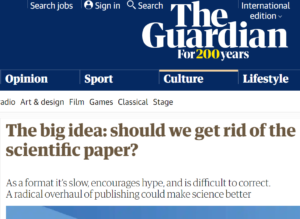By Glenn Hampson, Executive Director of the Science Communication Institute (SCI) and Program Director of the Open Scholarship Initiative (OSI)

Image: The Guardian.
A recent article posted to The Guardian titled The big idea: should we get rid of the academic paper?1 argues that because scholarly publishing is an old practice, and because it has flaws, it should therefore be replaced by something more “modern”. This basic argument has been animating much of the reform movement in scholarly publishing reform for decades now – that because we now have the Internet, then all older forms of communication must be obsolete.
Some of this argument seems reasonable, of course. Why keep driving gas powered cars if we can drive electric cars instead? Why read paper books when we can read them on a screen?
But most of this argument simply reveals a lack of in-depth understanding about scholarly publishing (no offense to the author is intended by this, because as the readers of this website understand, scholarly publishing is actually a very complicated subject). So, for example, of course the scholarly publishing process has flaws, as this article points out, but it is also essential to research and extremely effective at identifying good work and ensuring that bad work stays on the fringes. That’s by design, not accident.
Editorial review, peer review, submission formats, quality insurance networks like SciELO, and more, have all evolved over decades and centuries to make it possible for researchers to share their work with peers and the public in ways that protect and promote quality. Retractions happen as in any written product, but they are vanishingly rare as a percent of the total articles published every year. Hype happens but generally more as a function of media promotion than the article itself.
And the entire process is increasingly improving. More and more data is being included with papers; more peer review options are evolving; more open access options are evolving; more novel publishing approaches are evolving and being tested in the marketplace; we’re becoming more aware of bias and are working on ways to reduce it; we’re aware of the impact factor’s problems and are discussing how to address these; and overall, the scholarly publishing stakeholder community is constantly debating how to improve the entire system, from costs to access to evaluation and beyond. To characterize this system as “static” is simply misinformed.
It’s oversimplified as well. It’s the same kind of oversimplification we often hear that publishing solution “x” will work for everyone everywhere. When you actually understand the system, solutions like “everyone should pay for publishing with article processing charges (APCs)” or “we should all follow Plan S” quickly begin to fall apart. It’s like the electric car observation. I would love to have one: please buy it for me (actually, our household will need three – thank you).
So, instead of figuring out how to reinvent the wheel without adequate knowledge, let’s continue working together to learn more about what works and what doesn’t work, what’s needed and what isn’t. And in the meantime, let’s tip our hats to scholarly publishing and the many organizations and experts it takes to keep this complex and important system operating. There are so many opportunities for change and improvement.
I, for one, will continue to listen to all opinions – even the ones that claim we should just burn down the entire system and start over. But I think the most important opinions are the ones that the real experts have to offer – our researchers, editors, publishers, librarians, data managers, and others who actually work in scholarly publishing and understand how it operates, what it needs, how it can change, and how this change can be sustained. I can’t wait to see what this community comes up with in the years ahead.
Note
1. RITCHIE, S. The big idea: should we get rid of the scientific paper? [online]. The Guardian. April 11, 2022 [viewed 18 April 2022]. Available from: https://www.theguardian.com/books/2022/apr/11/the-big-idea-should-we-get-rid-of-the-scientific-paper
Reference
RITCHIE, S. The big idea: should we get rid of the scientific paper? [online]. The Guardian. April 11, 2022 [viewed 18 April 2022]. Available from: https://www.theguardian.com/books/2022/apr/11/the-big-idea-should-we-get-rid-of-the-scientific-paper
About Glenn Hampson
Glenn Hampson is the founder and executive director of the Science Communication Institute and program director of the Open Scholarship Initiative (OSI, an SCI project). In both capacities, Glenn is a frequent speaker on issues of scholarly communication and open access. Prior to SCI and OSI, Glenn served as a senior project manager for the Fred Hutchinson Cancer Research Center, communications director for a University of Washington research center, president of the Castle Pacific Publishing Company, managing editor and webmaster for the World Bank Group’s International Finance Corporation, associate editor for the Riverside Publishing Company, and field representative for a member of the US Congress. Glenn holds degrees in public administration, history and astronomy, serves on several boards, and has authored several books. He lives in Seattle with his wife and son where he coaches youth baseball and volunteers in schools and the community.
Como citar este post [ISO 690/2010]:

















Recent Comments